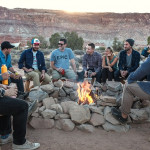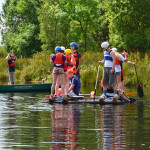Camping During Hurricane Season
Hurricanes are nothing to mess with, but with hurricane season making up half of the calendar year, there is no point in making a huge deal of it. You should still get yourself and your family out there camping and overlanding.
That being said, you should always keep the weather in mind when camping in areas vulnerable to hurricanes and this area is extensive. If you are within an hour driving distance of the Atlantic Coast or the Gulf of Mexico, you are potentially in the reach of a hurricane.
What this all means is that you just need to be prepared, As an overlander, this should come naturally, but here are some things to take into consideration.
1) You Should Watch The Weather Regularly
Hurricanes take time to form, but a tropical depression can turn into a full blown hurricane in just a matter of days.
For this reason, you should pay close attention to the weather if you intend to camp in or near coastal areas. Check the weather outlook at least every few days and daily when you get close to your trip date. Also keep in mind that even if a hurricane is well off the coast, it can affect your trip. Those of you on the beach will need to pay closer attention to Rip currents and areas will be more prone to strong thunderstorm production.
Be sure to take advantage of push notifications offered by many of the weather websites like Accuweather and The Weather Channel. They can be annoying, but you can always turn them off when your trip is over.
2) Pack A Weather Radar In Your Gear Bag
Your phone alerts are great, but you can not always count on them to get you the information that you need, especially in areas with spotty service. A weather radio can notify you of impending danger and is cheap insurance in the event of a sudden storm.
The most serious threat during hurricane season is a hurricane itself, but other serious weather can be a problem. Sever thunderstorms and tornadoes are much more prevalent during hurricane season because the same power that fuels a hurricane also fuels strong storms. You need to know about approaching storms if you are traveling into the danger zone and a cheap $30 a radio is great insurance.
3) Have A Backup Campground
It always pays to have a backup plan. Just in case you need to evacuate, you should have an alternate camping site in mind, preferably a few hours drive inland. You shouldn’t bother reserving a site, but just have some contact information on hand so that you can make calls quickly in the event you have to relocate.
If you are traveling long distance in an RV, this is particularly important because, once evacuation orders come in, those available campsites will fill up quickly.
Another good alternative to finding backup campsites is to research places that will allow you to camp for free. Stores like Walmart and many truck stops generally allow RV camping for overnight stays, but not at all locations. You do not want to have to scramble at the last minute, so take some time and do your research.
4) Evacuate Early In An Emergency
If orders come in to evacuate, you often have a few days, but you should do so immediately. As a tent camper or even an RV camper, you can not afford to chance bad weather. Even if a hurricane warning turns into a close miss, weather is still likely to get bad and winds can be a problem.
Another benefit to leaving early is avoiding the clogged interstates. In the last day of an evacuation, roads will be clogged and the drive will be grueling. Don’t put yourself through that. Get out fast so that you can find a back up campsite and enjoy the rest of our trip.
5) Understand The Dangers Of A Hurricane
The dangers of a hurricane go far beyond a direct hit. There are a number of dangers that you will face and if you are in a tent or RV, you will be ill prepared to deal with them.
One of the deadliest dangers will be storm surge. Storm surge is the rise in ocean level due to changing atmospheric conditions and the pushing of water onshore by strong winds. Depending on your location, you can be affected by storm surge as much as 25 miles inland.
Other dangers include strong storms and winds, both of which are real problems for campers.
6) Have Emergency Supplies On Hand
It pays to be prepared and as an overlander or camper, you know that. The problem is that many people like to travel light. The more gear that you have, the harder it is to keep it organized and the more room you need.
During storm season, you just need to find the room. Make sure to pack medical supplies, extra batteries, a weather radio, extra food and extra water. If you end up stuck at a location for longer than you planned, you will be prepared.
7) Know That Campgrounds Will Be Closed
You might think that you can go camping in a hurricane and ride out a small storm or that the chances of being hit are slim, but that may not matter. If evacuations are ordered, even if they are not mandatory, your campground will probably close. That means that no matter how you feel about facing a hurricane or a close miss, the decision will be made for you.



